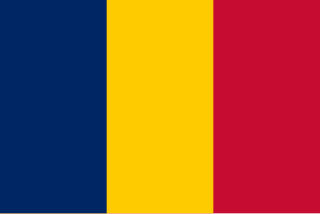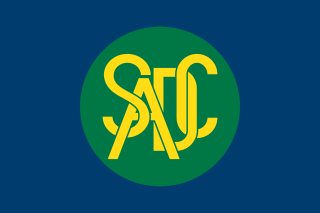The Human Rightssa Trust of Southern Africa, better known as SAHRIT, is a human rights groups established in October 2006 to promote human rights in Southern Africa. It has its headquarters in Harare.

Cameroon's noncontentious, low-profile approach to foreign relations puts it squarely in the middle of other African and developing country states on major issues. It supports the principles of non-interference in the affairs of third world countries and increased assistance to underdeveloped countries. Cameroon is an active participant in the United Nations, where its voting record demonstrates its commitment to causes that include international peacekeeping, the rule of law, environmental protection, and Third World economic development. In the UN and other human rights fora, Cameroon's non-confrontational approach has generally led it to avoid criticizing other countries.

Chad, officially known as the Republic of Chad, is a landlocked country in north-central Africa. It is bordered by Libya to the north, Sudan to the east, the Central African Republic to the south, Cameroon to the south-west, Nigeria to the southwest, and Niger to the west.

Human rights are moral principles or norms for certain standards of human behaviour and are regularly protected in municipal and international law. They are commonly understood as inalienable, fundamental rights "to which a person is inherently entitled simply because she or he is a human being" and which are "inherent in all human beings", regardless of their age, ethnic origin, location, language, religion, ethnicity, or any other status. They are applicable everywhere and at every time in the sense of being universal, and they are egalitarian in the sense of being the same for everyone. They are regarded as requiring empathy and the rule of law and imposing an obligation on persons to respect the human rights of others, and it is generally considered that they should not be taken away except as a result of due process based on specific circumstances.

Khoisan, or according to the contemporary Khoekhoegowab orthography Khoe-Sān, is a catch-all term for the "non-Bantu" indigenous peoples of Southern Africa, combining the Khoekhoen and the Sān or Sākhoen.
International human rights law (IHRL) is the body of international law designed to promote human rights on social, regional, and domestic levels. As a form of international law, international human rights law are primarily made up of treaties, agreements between sovereign states intended to have binding legal effect between the parties that have agreed to them; and customary international law. Other international human rights instruments, while not legally binding, contribute to the implementation, understanding and development of international human rights law and have been recognized as a source of political obligation.

A home, or domicile, is a space used as a permanent or semi-permanent residence for an individual, group or family. It is a fully or semi sheltered space and can have both interior and exterior aspects to it. Homes provide sheltered spaces for instance rooms, where domestic activity can be performed such as sleeping, preparing food, eating and hygiene as well as providing spaces for work and leisure such as remote working, studying and playing. Physical forms of homes can be static such as a house or an apartment, mobile such as a houseboat, trailer or yurt or digital such as virtual space. The aspect of ‘home’ can be considered across scales, from the micro scale showcasing the most intimate spaces of the individual dwelling and direct surrounding area to the macro scale of the geographic area such as town, village, city, country or planet.

The San peoples, or Bushmen, are members of various Khoe, Tuu, or Kxʼa-speaking indigenous hunter-gatherer groups that are the first nations of Southern Africa, and whose territories span Botswana, Namibia, Angola, Zambia, Zimbabwe, Lesotho and South Africa. In 2017, Botswana was home to approximately 63,500 San people, which is roughly 2.8% of the country's population, making it the country with the highest population of San people.

The Swati or siSwati language is a Bantu language of the Nguni group spoken in Eswatini and South Africa by the Swati people. The number of speakers is estimated to be in the region of 2.4 million. The language is taught in Eswatini and some South African schools in Mpumalanga, particularly former KaNgwane areas. Siswati is an official language of Eswatini, and is also one of the eleven official languages of South Africa.

The Southern African Development Community (SADC) is an inter-governmental organization headquartered in Gaborone, Botswana. Its goal is to further regional socio-economic cooperation and integration as well as political and security cooperation among 16 countries in southern Africa.

Slavery in Sudan began in ancient times, and recently had a resurgence during the Second Sudanese Civil War (1983-2005). During the Trans-Saharan slave trade, many Nilotic peoples from the lower Nile Valley were purchased as slaves and brought to work elsewhere in North Africa and the Orient by Nubians, Egyptians, Berbers and Arabs.
The African Commission on Human and Peoples' Rights (ACHPR) is a quasi-judicial body tasked with promoting and protecting human rights and collective (peoples') rights throughout the African continent as well as interpreting the African Charter on Human and Peoples' Rights and considering individual complaints of violations of the Charter. This includes investigating human rights violations, creating and approving programs of action towards encouraging human rights, and set up effect communication between them and states to get first hand information on violations of human rights. Although the ACHPR is under a regional government facility, they don't have any actual power and enforcement over laws. This ends up in them drafting up proposals to send up the chain of command to the Assembly of Heads of State and Government and they will act accordingly.

Southern Cameroons was the southern part of the British mandate territory of British Cameroons in West Africa. Since 1961 it has been part of the Republic of Cameroon, where it makes up the Northwest Region and Southwest Region. Since 1994, pressure groups in the territory claim there was no legal Document in accordance to UNGA RES 1608(XV) paragraph 5, and are seeking to restore statehood and independence from the Republic of Cameroon. They renamed British Southern Cameroons as Ambazonia.

The following outline is provided as an overview of and topical guide to South America.

Eritrea, officially the State of Eritrea, is a country in Eastern Africa, with its capital at Asmara. It is bordered by Ethiopia in the south, Sudan in the west, and Djibouti in the southeast. The northeastern and eastern parts of Eritrea have an extensive coastline along the Red Sea. The nation has a total area of approximately 117,600 km2 (45,406 sq mi), and includes the Dahlak Archipelago and several of the Hanish Islands.

The South Sudan People's Defence Forces (SSPDF), formerly the Sudan People's Liberation Army (SPLA), is the army of the Republic of South Sudan. The SPLA was founded as a guerrilla movement against the government of Sudan in 1983 and was a key participant of the Second Sudanese Civil War, led by John Garang. After Garang's death in 2005, Salva Kiir was named the SPLA's new Commander-in-Chief. As of 2010, the SPLA was divided into divisions of 10,000–14,000 soldiers.
The Electoral Institute for Sustainable Democracy in Africa, or EISA, is an organization founded in 1996 in Johannesburg to "promote credible elections, participatory democracy, human rights culture and the strengthening of governance institutions for the consolidation of democracy in Africa."

Strandfontein is a seaside resort 8 km east of Muizenberg, on the northern shore of False Bay in the City of Cape Town municipality in the Western Cape province of South Africa.
Cephas Lumina is a Zambian lawyer and human rights expert. From 2008 to 2014 he was the "United Nations Independent Expert on the effects of foreign debt and other related international financial obligations of States on the full enjoyment of all human rights, particularly economic, social and cultural rights", appointed by the United Nations Human Rights Council. He was succeeded by the Argentine lawyer Juan Pablo Bohovslavsky.
Patricia L. Beeman (1925–1996) was a human rights activist based in East Lansing, Michigan, who led local- and state-based efforts to fight apartheid in South Africa, and efforts in support of independence movements in Zimbabwe and Namibia. She was named to the Michigan Women's Hall of Fame in 1999 in recognition for her work in the field of civil rights.